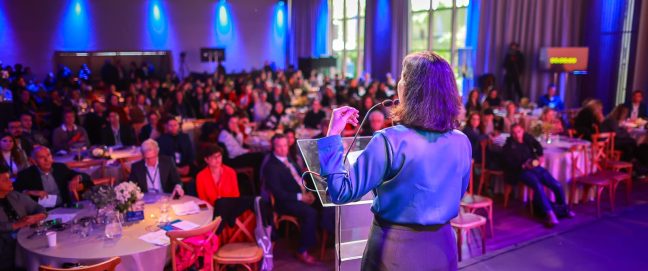A report by LGT Private Banking and the Centre for Strategic Philanthropy at the University of Cambridge’s Judge Business School shows rising wealth in the GCC translating into more strategic philanthropic practices. And an expert panel explored the report’s findings last week at an event in Dubai.

From left to right: Clare Woodcraft, Samsurin Welch, Nina Hoas, H.H. Sheikha Intisar AlSabah, H.S.H. Prince Max von und zu Liechtenstein, and Silvia Bastante discuss the recently launched report on Giving in the GCC.
The ‘Giving in the Gulf Cooperation Council: Evolving towards strategic philanthropy’ report launched last week in Dubai estimates giving to be worth USD 210 billion annually[1], spotlights good practices of how wealth is reflected in strategic giving and discusses some of the wider forces shaping the philanthropic landscape in the region.
In the event, a focused discussion among experienced philanthropists, academia and philanthropy specialists took place with speakers including Mauro Guillén and Sam Welch from Cambridge Judge Business School; Clare Woodcraft, Fellow of the Centre for Strategic Philanthropy at Cambridge Judge Business School; Prince Max von und zu Liechtenstein, Chairman LGT; Sheikha Intisar AlSabah, Founder of Intisar Foundation; Nina Hoas and Silvia Bastante from LGT Philanthropy Advisory.
The day’s event included several insightful interventions and interesting exchanges on the report’s key findings.
Family businesses are driving strategic and institutionalized philanthropy in the Gulf
With family businesses comprising up to 90 per cent of the private sector economy in the GCC, family businesses are prime movers of philanthropic giving alongside the royal foundations. GCC philanthropists are institutionalizing, innovating and contributing to diverse causes ranging from building education and healthcare infrastructure towards niche philanthropic causes such as innovative therapies for child autism and mental well-being for women in violent and conflict contexts.
GCC philanthropists are also more directly engaged in their causes. For some it is about building trust with communities and deeper impact. However, it is also seen as a direct result of an emerging sector struggling to attract talent and concerns about the trustworthiness of NPOs in the GCC region. More professionalization of the sector was a shared view.
The report is also mindful of the generational shift unfolding in the GCC that will influence the evolution of philanthropic practices, with the younger philanthropists gravitating to social entrepreneurship models and the application of market-based solutions into the sphere of philanthropy.
GCC philanthropists embrace collaboration with government
What distinguishes GCC philanthropy is the growing propensity to engage in inter-philanthropy and government collaboration. Complementing government policy initiatives and scaling up are main drivers of collaboration suggests the report. ‘Engagement with government is most remarkable in the region. We don’t see that elsewhere’, stressed Nina Hoas.
Despite of this, regulatory burdens still hold back institutionalized giving. While governments are working to relax regulatory frameworks, the report suggests more needs to done to facilitate cross border and emerging forms of giving.
Charity and philanthropy is growing side by side in the region
Much debate centred on the contrast between the charitable and culturally inspired giving that characterizes the bulk of giving in the region and the emergent forms of structured giving emphasizing social change. Some philanthropists suggested that their charitable practices inspired their transformational giving and served as the learning grounds for more strategic practices. ‘Philanthropy should not be about survival but about thriving’ asserts Kuwaiti philanthropist Sheikha Intisar AlSabah.
Others believed that charity is a unique feature of GCC giving. Relief and charity serve redistributive justice goals and do not take away from the more strategic giving that advances public policy objectives; each guided by its own set of values and frameworks, playing an equally important role in society.
Another shift taking place is that philanthropists – especially younger generations – are becoming more visible about their philanthropic investments and impact in the hopes that this will inspire others to follow suit. Yet, the tension between transparency in philanthropic practices and the cultural tradition of discretion is an issue the sector continues to grapple calling for more diverse views such as those of Muslim Sharia scholars to weigh in.
Growing strategic practices are being held back by a scarcity of data
Repeatedly discussed was the scarcity and fragmented nature of data and information to support strategic philanthropy. Data scarcity not only spans communities in need, but also the ‘what’ and ‘where’ philanthropic investments are made and the knowledge about the ‘how’. Clare Woodcraft explained ‘If we don’t have data, we miss the opportunities for collaboration and institutionalization.’ So while there are pockets of good practices in evidence-based giving and impact measurement, more needs to be done for these practices to build into a sector wide trend.
‘The report is a call for philanthropists to elevate their giving’ suggests Prince Max von und zu Liechtenstein. It opens the space for reflection on how an emerging GCC philanthropic sector can define itself in a rapidly changing context and contribute to solving some of the regions complex socio-economic challenges.
For more insights, download the report here.
Heba Abou Shnief is a socioeconomic development professional specialising in how strategic and private philanthropy can best serve public development policy objectives and the Alliance magazine Regional Representative for the Arab region.

Watch at a replay of the event below
Footnotes
- ^ The calculation is based on a triangulation of data of giving in Saudi Arabia, a 2.5 per cent Zakat — a religiously mandated giving for Muslims — applied to private sector GDP, the number of billionaires in the region and expert estimates.






Comments (0)